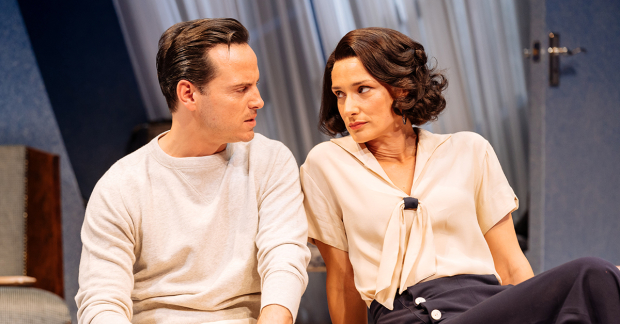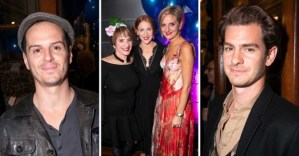Review: Present Laughter (Old Vic)
Andrew Scott stars in Matthew Warchus’ new production of Noël Coward’s comedy

© Manual Harlan
'I'm always acting,' declares Garry Essendine, Noël Coward's famous, in demand and occasionally overwrought protagonist in Present Laughter. In a blur of people, wit, booze and charm he blusters and brags his way through life, batting off adoring fans and obsessed lovers with a smidgen of Shelley.
He's a suave central figure and in Matthew Warchus' illuminating and luminously funny new production, Andrew Scott plays him beautifully, teetering on the edge of high drama and pitiful depression at every moment. He is, as we've come to expect from anything with Scott behind it, a brilliant, off-beat presence, and Scott never misses an opportunity to milk one of Coward's glorious one-liners for all they are worth.
The play, set in the front room of Essendine's flat, takes place over the course of a week or two, opening the morning after the night before, where a young woman awakes and expects her encounter with the famous actor Essendine to have changed his life as much as her own. Quickly we realise that these mornings are regular occurrences in the life Essendine lives. He's in and out of bed, while his nearest and dearest – his (ex)wife, his manager, his producer – try to mop things up around him. But who could dislike Essendine really? In the hands of Scott he is both awful and irresistible. He's angry, ridiculously overblown and very very funny.
Scott has commendable foil in the form of Sophie Thompson as secretary Monica, one of several staff who circle around the proceedings. Thompson is a mix of school mistress, mother and friend and she makes the early scenes sing. Indira Varma, as Essendine's wife, who is trying her hardest to keep Essendine from unravelling, is also superb: light-footed with the comedy, and perfectly barbed with the wit. I found I wanted to watch all of them, all together, all the time.
Warchus' production focuses in on the script, bringing out a sense of Essendine's sadness whilst making sure we are guffawing pretty much all the time. The second act madness – which goes all French farce – is glorious. Warchus emphasises the recklessness of Essendine, demonstrating how his disregard for self care is part of his problem. And there is a recurring theme of kindness – how those with fame need it and should also give it.
There's swapping of the gender of several characters, most notably in producer Harry and his wife Joanna who have become Helen and Joel. It's an apposite switch, which fits believably and easily into the proceedings. Essendine's hedonism and sexual drive is such that it seems quite obvious that he'd happily switch between man and woman.
Warchus says he has never directed a Coward before, and watching this, you'd never believe it. He has brought together a group of actors who merge impeccably, working off each other to make the script come to life. It is a wonderfully enjoyable few hours in the theatre, which, as it should, brings comedy, but also tragedy, too.


















